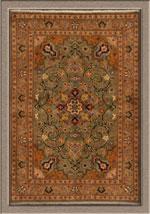Some time ago, I happened to meet a lady in a gathering of some friends. She is in her late sixties, and seems to be very well-educated. We are introduced by mutual friends and start a casual dialogue. She finds that I am in Oriental rugs business, and the conversation is somehow pushed toward this subject. She tells me how fond she is of these pieces of art and loves to have a few rugs of her own. “But I can never convince myself to buy one” she tells me. Why is that? I ask her because I am just curious to know.
She goes on to explain that she just knows it would be ethically wrong. We are losing our dear soldiers in wars against terrorism and against countries where Al Qaeda has its base. Anybody purchasing a rug that has been woven in those countries is, directly or indirectly, supporting terrorism. Of course, people are entitled to an opinion. But is it really that simple to make such a connection and come to such unfair conclusions?
She felt so strongly about this issue that I decided not to pursue it any further. It was a friendly and casual gathering after all, and I was not invited there to start arguments with other guests. At any rate, ever since, I have been eager to express my thoughts on the topic. This is my business, my passion, and my hobby, and I too, feel strongly about the subject.
I have been on many “buying trips” since I was very young. The majority of handmade rugs are made in remote villages of Iran, Pakistan, India, Afghanistan, and Turkey. In many villages, weaving rugs is all people do. They know of nothing else, and they can produce nothing else. Weaving has been their job, and their only means of income for generations. These are people limited to a very simple lifestyle, and the most they know about politics and international relations, is that there may be other cities and villages on the face of the planet where rug weaving is not the only job available to their citizens. There are other choices. They are in no way involved with what goes on with the games of international politics.
Once on a buying trip in Tabriz, located in northwestern region of Iran, my agent suggests that we visit a neighborhood which mainly consists of rug weavers after looking for rugs in the great Bazaar of Tabriz for two full days. We end up in a small house where the weaver has just finished a 7 X 10 Tabriz rug. This is a small family with a nine year old boy and a twelve year old girl. They were all so proud of their rug, and I admit it was a gorgeous piece with a very high number of knots per square inch, a beautiful pattern, and amazing harmony of colors. We agree on a price and end up buying it. As we approach the little gate to get into our car, I notice the little boy running after us with a healthy-looking chicken under his arms talking to us with tears in his eyes. The rest of the family never left their room, which was somewhat strange. He is speaking Turkish which I do not understand. I look at my agent for an explanation and he motions towards the car. Once we are in the car and a couple of miles away, I ask him about the incidence. The little boy was saying that his chicken had laid fresh eggs just this morning, and he would ask his mother to cook us dinner with those eggs if we could leave “his rug” behind. I felt numb for a few minutes. How could some kid get so attached to a rug is beyond the understanding of most of us. They have a single room with a loom in it. Kids do their homework around it; they play around it, they watch mom and dad work on it, they eat their food around it, and sleep around it. It becomes the centerpiece of their home just as a TV set is to our modern life. They get attached to the rug, and it gets very hard to part with it. Now I know why nobody, except for the little boy, left the room.
Weaving these works of art has nothing to do with politics or terrorist movements. There is a lot of “love” involved with these pieces, and politics is the main contrast to “love”. What you support when you purchase a rug is the livelihood of village families, and not Al Qaeda. It is completely ethical to buy a Persian or Oriental rug for your home. It is!
Rug Firm is a direct importer of fine Persian and Oriental rugs. Rug Firm offers its customers free shipping within the continental U.S., free padding with every purchase, and a 30-day risk-free money back guarantee. Professional wash and repair service of any type of handmade rugs are available. Best of Persian and Oriental Rugs


